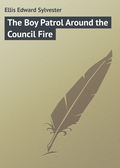
Ellis Edward Sylvester
The Flying Boys in the Sky
CHAPTER IV
TRYING FOR ALTITUDE
Ah, but Harvey Hamilton was sly. He began slowly creeping up until his machine was directly over the rear passenger coach, there being three beside the express car. Had he dropped a stone from his perch, it would have fallen upon the roof of the last one. The exultant expression on the myriad of faces took on a tint of anxiety. The fireman yanked open the door of the fire-box and shoveled in coal. No need of that, for 39 was already blowing off, even when running at so high speed. Jim Halpine had drawn over the long reversing lever till it stood within a few inches of perpendicular and another shift would have choked the engine.
The young aviator held his place for a brief while and then began gradually drifting back again. Bohunkus Johnson groaned.
“Confound it! what’s de use ob trying to be good?” he wailed; “dem folks will grin dere heads off. Harv! make tings hum!”
Heedless of him, Harvey was carrying out his own scheme. He saw that the game was his and he was playing with the locomotive. When gaining on it, the airship was not doing its best, and his slight retrogression was in order to make his victory more impressive. Each contestant was going fully sixty miles an hour. No. 39 could do no more, but the aeroplane had not yet extended herself. She now proceeded to do so, inasmuch as in the circumstances the struggle must soon terminate.
Having dropped well to the rear again, Harvey called upon the motor to do its best. Its humming took on the character of a musical tone, and the propeller spun around, twelve hundred revolutions to the minute. The keenest eye could detect nothing of the ends of the blades, and only faintly discern them nearer the shaft, as if they were so much mist.
And then the biplane forged bravely ahead. She moved steadily along over the roofs of the cars, one after the other, and pulled away from the engine whose ponderous drivers appeared to be spinning around with the dizzying swiftness of the propeller overhead. Jim Halpine was utilizing every ounce of power, but could do no more, for he was already doing his best. It humiliated him to be thus left behind, but there was no help for it. In his chagrin he tried a little trick which deceived no one, not even the two victors. Pretending he detected something amiss on the rails, he emitted a couple of blasts from his whistle and shut off steam. It looked as if he was actuated by prudence, but the obstruction was imaginary.
Most of the passengers like true sportsmen cheered the winner. Even the grinning fireman circled his cap again about his tousled head, but the engineer was glum and acted as if the only thing in the world of interest to him was the rails stretching away in front. What did he care for airships bobbing overhead? They were only toys and could never amount to anything in the economy of life.
As for Bohunkus Johnson he could not contain himself. Harvey remained as calm as a veteran, and gave no attention to anything except his machine, but his companion stood up in the hurricane at the imminent risk of playing the mischief with the aeroplane’s center of gravity, waved his cap and furiously beckoned the engineer not to lag behind. His thick lips could be seen contorting themselves and evidently he was saying something. Had the laughing passengers been able to catch his words – which they were not – they would have heard something like the following:
“Why doan’ yo’ trabel? Yo’s only walking; we ain’t half trying; can’t yo’ put on more steam and make us show what we can do? I’m plum disgusted wid yo’.”
Harvey Hamilton did not speak. He was “letting out” the machine. He meant to learn what it could do. When several hundred yards ahead of the train, he lifted the lip of the rudder in front, and the structure glided upward until he was a quarter of a mile above the earth. Even then Bohunkus behaved so extravagantly that the aviator turned his head and motioned to him to cease.
“Can’t doot, Harv! My mouf am so wide open dat it’ll take me a good while to bring my jaws togeder agin, and I’m ready to tumble out head fust.”
By and by the colored youth toned down enough to resume his seat and check his explosions of delight, though he looked around and waved his hand several times at the train which was now so far to the rear that his action was not understood.
“Gee! but it’s getting cold!” he exclaimed some minutes later, with a shiver. He buttoned his thick coat to the chin, donned his mittens, and wondered what it all meant. He had never understood, though he had been told more than once, that temperature decreases with increasing altitude. He had objected to donning such thick garments when about to start on their flight, but Harvey was the boss and insisted.
Bohunkus’s next surprise came when he looked between his feet. They were directly over the city noticed some time before, but the buildings were shrunken and mixed together in a way that even he understood.
The anemometer suspended at the side of Harvey Hamilton showed that the aeroplane was coursing through the air at the rate of not quite a mile a minute. With the low temperature caused by the altitude, the wind created in the still atmosphere cut the faces of the two like a knife, and even penetrated their thick clothing. Bohunkus turned up his coat collar, and drew his cap over his ears, but his feet ached. He hoped the aviator would soon strike milder weather, though the colored youth did not know whether it was to be sought for above or below.
“If it gits colder as yo’ go up,” he reflected between his chattering teeth, “it must be orful cold when yo’ reach heben; I remember now dat I was tole something ’bout dat, but I thought dey was fooling me.”
The front rudder still sloped upward, and Harvey showed no intention of dropping lower or even of maintaining the level already reached. He and his companion had started on a week or ten days’ outing, and it struck him that now was as good a time as he was likely to have for making a notable record.
So the propeller kept humming and they continued to climb. A glance at the barograph by his side showed that he had reached five thousand feet; to this he added another thousand, then another, and he felt a thrill when the indicator made known he was close to nine thousand.
Although, as you may know, several aviators have mounted almost two miles, none had done so at the time of which I am now speaking. Harvey was near the limit, and he had but to persevere a little longer to achieve a grand triumph. But the cold was becoming almost unbearable. In the hope of moderating the piercing chill, he lessened his speed, but was not sensible of much improvement.
His unremitting attention was not needed and he turned his head and looked at Bohunkus. The sight made him laugh. The negro had not only drawn his upturned collar about his ears, with his cap sunk low over them, and his mittened hands shoved into his pockets, but he had shrunk within himself to that degree that only his staring eyes and the tip of his nose were visible. He was hunched together, and gave one of the best imitations imaginable of a young man freezing to death.
“I know his race doesn’t like cold weather, but it won’t hurt him,” reflected Harvey with another look at his barograph. To his astonishment, he had made no perceptible gain during the last several minutes. He turned on full power and kept the forward rudder inclined upward. He waited awhile before examining the instrument again. So far as it could indicate he was not a foot higher than before.
He was mystified. What could it mean? With the propeller revolving more than a thousand times a minute, he ought to have risen a half mile higher.
“I never heard of anything like it; the explanation is beyond me.”
With a thrill of misgiving, he glanced at the different parts of the machine. There were the two slightly curving wings, measuring thirty-five feet from tip to tip; the horizontal rudder on the front outrigger responded easily to the levers, as he proved by test; the ailerons or wing tips, one above the other, worked simultaneously and with the same ease; the ash which formed the foundation of the engine, the whitewood of the ribs, and the sprucewood of most of the structure, all scraped and highly varnished, did not show the least flaw. The rigidity which is indispensable in the framework was maintained throughout. The rubberized linen covering of the wings was taut and as smooth as silk, and the eye could not detect the slightest wire or thing out of gear.
“Professor Sperbeck never told me anything of this, though if he were here, he would understand it. I wonder whether we have climbed any farther.”
Another inspection of the instrument failed to show that the biplane had ascended an inch.
“Can it be that our height has anything to do with it – ”
Harvey Hamilton uttered an exclamation. The mystery was solved. The aeroplane had risen so high that the rarefied air refused to lift it farther. The propeller was whirling at its utmost velocity, but the cold, thin atmosphere could sustain no more. It was impossible, situated as he was, to go any higher.
“If Bohunkus wasn’t with me, I could rise a half mile or more, but there’s no use of trying it now. Some time I’ll do it alone.”
The limit marked was a trifle under nine thousand feet. It was a notable exploit, but, as we know, it has been surpassed by other aeroplanes, and more than doubled by aeronauts.
Another fact flashed upon Harvey: it was two hours since he and his companion had started on the flight that was destined to be a memorable one, and they were a hundred miles from home. There could be only a small amount of gasoline left in the tank, and it would be impossible to return without procuring more. Prudence urged that he should lose no time in doing so. He slowly advanced the control lever, the front rudder dipped downward and he began approaching the earth. Some minutes must pass before they should feel the pleasant change of temperature, but it could not be long delayed.
In the midst of his pleasant anticipations, Harvey was startled by a shriek from Bohunkus:
“We’s gone, Harv!” he shouted; “nuffin can sabe us!”
CHAPTER V
A WOODLAND EXPERT
The aeroplane was caught in a furious snow squall. While descending it ran into the swirling tumult which in an instant enveloped it like a blanket, the myriads of particles filling the air so thickly that the terrified Bohunkus could not see the ailerons and even the aviator was partly shrouded from sight. Harvey Hamilton was faintly visible as he leaned over and manipulated the levers. Not only was the snow everywhere, but the machine itself was rocking like a ship laboring in a storm. It tipped so fearfully that the negro believed it was about to capsize and tumble them out. He shrieked in his terror, and held fast for life.
Harvey paid no heed to him. He had enough to engage his skill and wits. He recalled that Professor Sperbeck had told him what to do when caught in one of those elemental outbursts. Instead of running away from it, he headed for its center, so far as he could locate it, as the navigator does when gripped by the typhoon of the Indian Ocean.
Within five minutes of the aerial explosion, as it may be called, the biplane was sailing in the same calm as before. The sun was shining low in the sky and all was as serene as the mildest summer day that ever soothed earth and heavens. The gust had come and gone so quickly that it seemed like some frightful nightmare. The youths might have doubted the evidence of their senses, but for the reminder of the snowflakes on the wings, different parts of the machine and their clothing. They had entered so balmy a temperature, however, that the particles soon dissolved and left only a slight moisture behind them.
“Wal, if dat don’t beat all creation,” mused Bohunkus; “de fust ting I knowed I didn’t know anyting and de next dat I knowed wasn’t anyting. Wonder if Harv seed dat yell I let out when dat rumpus hit me on de side ob my head.”
The aviator acted as if unaware of the dusky youth’s presence. Knowing the gasoline was nearly gone, he centered his thoughts upon making a landing. To his astonishment he saw an immense forest below him, many miles in extent. This seemed remarkable in view of the fact that only a short time before he had sailed over a large city, which could not be far to the south. He would have turned about and made for it, knowing he could renew his supply of fuel there, and find accommodations for himself and companion. But the fluid was lower than he had supposed. It would not carry him thither and he must volplane, or glide to earth, the best he could.
It need not be said that a stretch of woods is the worst place in the world for an aeroplane to descend to the earth. In fact it is impossible to land without wrecking the apparatus and endangering the lives of those it is carrying.
The keen eyes of the youth were scanning the ground below when to his surprise he caught sight of a village of considerable size to the westward. Why he had not observed it before passed his comprehension. It was barely two miles distant and he was wondering whether he had enough gasoline left to carry him over the woods to the broken country beyond when he made a second and pleasing discovery. A short distance ahead an open space in the forest showed, – one of those natural breaks that are occasionally seen in wide stretches of wilderness. It was several acres in extent and seemed at that altitude to be free of stumps and covered with a sparse growth of dry grass, so level that it formed an ideal landing place. He did not hesitate to make use of it.
Now when an aeroplane comes down to earth, the greatest care is necessary to avoid descending too suddenly. A violent bump is likely to injure the small wheels beneath or the machine itself. The aviator therefore oscillates downward somewhat after the manner of a pendulum. When near the ground, he shifts his steering gear so that the machine glides sideways for a little way. Then he circles about or takes a zig-zag course, until it is safe to shut off power and alight. As our old friend Darius Green said, the danger is not so much in rising and sailing through the sky as it is in ’lighting.
Harvey Hamilton displayed fine skill, seesawing back and forth until at the right moment the three small wheels touched the ground, the machine under the slight momentum ran forward for two or three rods, and then came to a standstill. A perfect landing had been effected.
“Gee, but dat’s what I call splendacious!” exclaimed Bohunkus; “it’s jest de way I’d done it myself.”
The aviator leaped lightly from his seat, and his companion did so more deliberately. He yawned and stretched his arms over his head. Harvey gave him no attention until he had examined the different parts of the machine and found them in order. Then he looked gravely at the African and asked:
“Didn’t I hear you make some remark at the moment we dived into that snow squall?”
“P’raps yo’ did, for de weather was so funny dat it war nat’ral dat I should indulge in some obserwation inasmuch as to de same.”
“But why use so loud tones?”
“Dat was necessumsary on ’count ob de prewailing disturbance ob de atmospheric air wat was surrounding us.”
“I’m glad to hear your explanation, but it sounded to me as if you were scared.”
“Me scared! Yo’ hurts my feelings, Harv; but I say, ain’t yo’ gwine to tie de machine fast?”
“What for?”
“To keep it from running away.”
“It won’t do that unless some one runs away with it; but, Bunk, we can’t do any more flying till we get some gasoline and oil, and it doesn’t look to me as if there is much chance of buying any in these parts.”
“Mebbe we can git it ober dere.”
“Where?”
“At dat house jest behind yo’.”
Harvey turned about and met another surprise, for on the farther edge of the natural clearing stood a dilapidated log dwelling, with portions of several outbuildings visible around and beyond it.
“I must be going blind!” was his exclamation; “I came near passing this spot without seeing it and never noticed that house.”
But the young man was hardly just to himself. In his concentration of attention upon a landing place, he had given heed to nothing else, and the descent engaged his utmost care until it was finished. It was different with his companion, who had more freedom of vision. Moreover, the primitive structure which the aviator now saw for the first time was so enclosed by trees that it was hardly noticeable from above.
No fence was visible, but a small, tumble-down porch was in front of the broad door, which was open and showed a short, dumpy woman, slovenly dressed and filling all of the space except that which was above her head, because of her short stature. Her husband, scrawny, stoop-shouldered, without coat, waistcoat or necktie, wearing a straw hat whose rim pointed straight upward at the back and almost straight downward in front, with a yellow tuft of whiskers on his receding chin, and a set of big projecting teeth, was slouching toward the two young men, as if impelled by a curiosity natural in the circumstances. The thumb of each hand was thrust behind a suspender button in front, and it was evident that he felt some distrust until Harvey Hamilton’s genial “Good afternoon!” greeted him. His trousers were tucked in the tops of his thick boots, which now moved a little faster, but came to a stop several paces off, as if the owner was still timid.
“How’r you?” he asked with a nod, in response to Harvey’s salutation; “what sort of thing might you be calling that? Is it an aeroplane?”
“That’s its name; you have heard of them.”
“I’ve read about them in the newspapers and studied pictures of the blamed things, but yours is the first one I ever laid eyes on.”
Despite the uncouth manner of the man, it was evident that he possessed considerable intelligence. He stepped closer and made inquiries about the machine, its different parts and their functions, and finally remarked:
“It’s coming, sure.”
“What do you refer to?” asked Harvey.
“The day when those things will be as common as automobiles and bicycles. If I don’t peg out in the next ten years, I expect to own one myself.”
“I certainly hope so, for you will get great pleasure from it.”
“Not to mention a broken neck or arm or leg,” he remarked with a chuckle. “Now I suppose you call this contrivance a biplane because it has double wings?”
“That is the reason.”
“And it seems to me,” he added, turning his head to one side and squinting, “the length is a little greater from the nose of the forward rudder to the end of the tail than between the wing tips?”
“You are correct again; there is a difference of about two feet.”
“The wings are curved a bit; I have read that that shape is better than the flat form to support you in air.”
“Experiments have proved it so.”
“And this stuff,” he continued, touching his forefinger to the taut covering of one of the wings, “is rubberized linen?”
“It is with our machine, though some aviators prefer other material.”
“Spruce seems to be the chief wood in your biplane.”
“Because of its lightness and strength.”
“The horizontal rudder in front must be used in ascending and descending and the two vertical ones at the rear for steering your course. I should judge,” he said, scrutinizing the motor, “that your engine has about sixty-horse power.”
“You hit it exactly; I am astonished by your knowledge.”
“It all comes from remembering what I read. And the wing tips are the ailerons, and the engine weighs about three hundred pounds.”
“A trifle less, the whole weight of the aeroplane being eight hundred pounds.”
“Your propeller is made of black walnut, and has eight laminations, and when under full headway revolves more than a thousand times a minute.”
“See here,” said Harvey; “don’t say you haven’t examined aeroplanes before.”
“As I told you, I never saw one until now, but what’s the use of reading anything unless you keep it in your memory? That’s my principle.”







